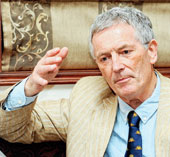 |
| Charles Allen at the Calcutta Club. (Amit Datta) |
Emperor Ashoka had a ubiquitous presence in Nehruvian India. Those who grew up in those times could not avoid a brush with this great ruler who abjured violence after the bloody battle of Kalinga, and thereafter was instrumental in the spread of Buddhism from Gandhara — that is modern Afghanistan — to the far reaches of south-east Asia, thereby establishing it as a world religion.
So it may come as a surprise to the unenlightened that Ashoka was lost in oblivion before the great Orientalists re-discovered him in the 19th century. Charles Allen, historian and author known for such titles as Soldier Sahibs, Kipling Sahib: India and the making of Rudyard Kipling, and Plain Tales from the Raj, was here last Wednesday to introduce his latest book, Ashoka, at a talk organised by Intach at the Calcutta Club, said his book was an effort at unravelling the reasons behind Ashoka’s disappearing act.
Allen, who has only recently recovered from serious illness, showed signs of fatigue as he spoke about scholars like James Prinsep, William Jones, the Asiatic Society and a lost Ashokan copper plaque and a film on the controversy over what was alleged to be a casket containing Buddha’s relics discovered by a local policeman in Gorakhpur in 1892.
Allen, who was born in India, says his father was in political service, and his family has Raj associations going back to two centuries. But he finds India under Indians “much more fascinating”. So the research that went into making this book was a journey of discovery for him.
“There is nothing like a good mystery,” he says and what was most remarkable about Ashoka was that his name was so effectively deleted from records that he was forgotten for 2000 years. But the identity of this great ruler was pieced together once again from inscriptions and a few mysterious stone monuments that survived.
The British Orientalists had achieved this great task by deciphering the mysterious script in which the inscriptions were written. With equal devotion Allen reconstructed this entire, elaborate process by putting together fragments of the tale of Brahmanical hostility towards Buddhism and how the silence of generations of Brahman pundits and genealogists deleted Ashoka’s name from India’s history. “The record-keepers, the diwans, were always Brahmans,” he adds.
“The book is a tribute to the Orientalists,” says Allen, and explains how unjustified Edward Said was in inveighing against them. Allen admits that he had to expunge quite a bit of the book as the publisher thought it would offend many. Intolerance is not peculiar to any particular phase of history.










